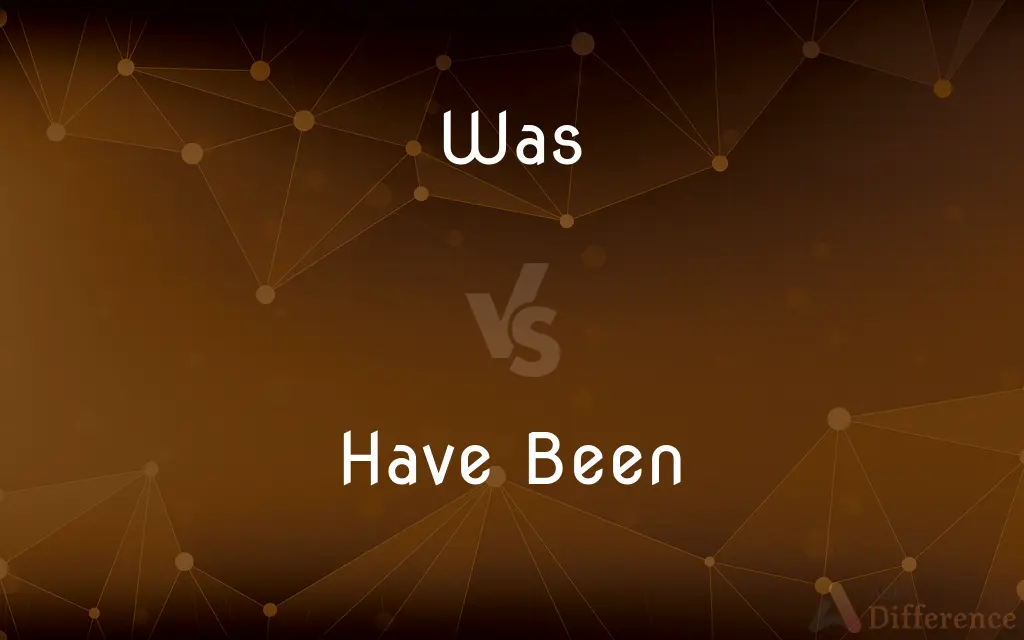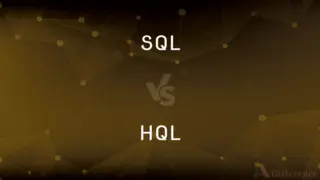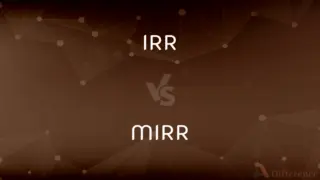Was vs. Have Been — What's the Difference?
Edited by Tayyaba Rehman — By Fiza Rafique — Published on December 28, 2023
"Was" is the past tense of "be" for singular subjects; "Have Been" is the present perfect form of "be" indicating a state that started in the past and may continue.

Difference Between Was and Have Been
Table of Contents
ADVERTISEMENT
Key Differences
"Was" functions as the simple past tense form of the verb "be" for singular subjects. For instance, when discussing a past event or condition related to one person or thing, "Was" is used. On the other hand, "Have Been" is utilized within the present perfect tense to describe a state or action that began in the past and possibly continues in the present.
For example, if one speaks of an event that occurred yesterday, they would likely use "Was." Conversely, if describing an experience that commenced previously and might still be relevant or ongoing, "Have Been" becomes appropriate.
When making statements regarding past conditions, "Was" can be directly implemented. For instance, "She was tired." In contrast, "Have Been" often implies a continuing state from the past to now, like "They have been friends since childhood."
The structure of sentences differs between the two. With "Was," sentences are often straightforward, emphasizing a past state. With "Have Been," the focus leans towards a connection between past actions or states and the present.
"Was" is limited to singular subjects in past simple tense (e.g., I, he, she, it), whereas "Have Been" pairs with both singular and plural subjects in present perfect tense when used with auxiliary verbs "have" or "has" accordingly.
ADVERTISEMENT
Comparison Chart
Grammatical Form
Simple past tense of "be"
Present perfect form of "be"
Subject Agreement
Used with singular subjects
Used with both singular and plural subjects
Time Reference
Refers only to past events
Refers to past events with relevance to now
Continuation Aspect
Doesn't indicate continuation
Indicates an action or state might continue
Sentence Example
"She was at the party."
"They have been at the party since 5 PM."
Compare with Definitions
Was
Past tense form of the verb "be" for singular subjects.
She was excited about the trip.
Have Been
Present perfect form of the verb "be."
They have been to France several times.
Was
Used to describe singular entities in past events.
The movie was great.
Have Been
Indicates an action or state starting in the past and possibly continuing.
I have been working here for five years.
Was
A tool for forming the passive voice in past events.
The book was written by her.
Have Been
Forms part of passive voice constructions in present perfect tense.
The letters have been sent.
Was
A component in past continuous tense constructions.
He was running when I saw him.
Have Been
Suggests repetition of an action over time up to now.
They have been visiting us annually.
Was
Indicates a state or condition in the past.
The weather was lovely yesterday.
Have Been
Used to describe experiences up to the present moment.
We have been to that new café.
Was
First and third person singular past indicative of be. See Note at you-uns.
Was
Inflection of be.
I was castigated and scorned.
Was
Inflection of be.
It was a really humongous slice of cake.
Was
Used in phrases with existential there when the semantic subject is (usually third-person) plural.
There was three of them there.
Was
Inflection of be.
Was
Inflection of be
Was
Inflection of be
Was
The first and third persons singular of the verb be, in the indicative mood, preterit (imperfect) tense; as, I was; he was.
Common Curiosities
What's the difference between "Has Been" and "Have Been"?
"Has Been" is used for third-person singular subjects, while "Have Been" is used for I, you, we, and they.
When should I use "Was" in a sentence?
Use "Was" for singular subjects to indicate a past state or action.
Can "Was" be used with plural subjects?
No, "Was" is used with singular subjects. For plural subjects, use "Were."
Can "Was" form the passive voice?
Yes, "Was" can be used to form the passive voice for past events.
Can "Have Been" indicate life experiences?
Yes, "Have Been" can describe life experiences up to the present moment.
Is "Have Been" suitable for ongoing actions?
Yes, "Have Been" can indicate an action or state that began in the past and may still be continuing.
Is "Have Been" always followed by an -ing verb?
Often, but not always. It can be followed by a past participle in passive constructions.
Which is used for a specific point in the past, "Was" or "Have Been"?
"Was" is used to refer to a specific point in the past.
Is "Have Been" used to describe recent actions?
Yes, "Have Been" can describe recent actions with a connection to the present.
Is "Was" part of the present perfect tense?
No, "Was" is the simple past tense. "Have Been" is part of the present perfect tense.
What's the negative form of "Was"?
The negative form of "Was" is "Was not" or "Wasn't."
How do I make questions with "Have Been"?
Begin with "have" or "has" followed by the subject, then "been." E.g., "Have they been to the museum?"
Does "Have Been" always indicate a continuing action?
Not always. "Have Been" can refer to actions that happened at an unspecified time in the past but still have relevance to the present.
Which tense is "Was" associated with?
"Was" is associated with the simple past tense.
Can "Was" indicate a habitual action in the past?
No, for habitual past actions, "used to" or "would" is more appropriate.
Share Your Discovery

Previous Comparison
SQL vs. HQL
Next Comparison
IRR vs. MIRRAuthor Spotlight
Written by
Fiza RafiqueFiza Rafique is a skilled content writer at AskDifference.com, where she meticulously refines and enhances written pieces. Drawing from her vast editorial expertise, Fiza ensures clarity, accuracy, and precision in every article. Passionate about language, she continually seeks to elevate the quality of content for readers worldwide.
Edited by
Tayyaba RehmanTayyaba Rehman is a distinguished writer, currently serving as a primary contributor to askdifference.com. As a researcher in semantics and etymology, Tayyaba's passion for the complexity of languages and their distinctions has found a perfect home on the platform. Tayyaba delves into the intricacies of language, distinguishing between commonly confused words and phrases, thereby providing clarity for readers worldwide.













































